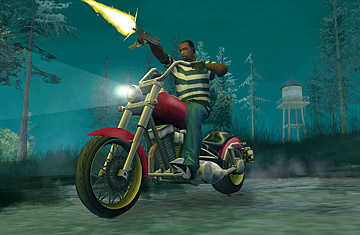
A scene from Grand Theft Auto: San Andreas
The video game Postal II lets players "go postal" and start a killing spree. You can shoot people in the leg and, if they try to crawl away, douse them in gasoline and set them on fire. You can lunge at schoolgirls with a shovel and when they beg for mercy, go ahead and decapitate them anyway. You can also urinate on burning people while delivering witticisms like "Now the flowers will grow."
If all that makes you think, "There ought to be a law ..." you might be in luck. In 2007, the state of California made it illegal to sell violent video games to minors. Next Tuesday, the Supreme Court will hear a challenge to the ban from the video-game industry, which argues that the law violates freedom of speech. It seems likely the court will strike down California's law — as two federal courts already have.
California's law makes it illegal to sell minors video games that meet an elaborate test: they must involve "killing, maiming, dismembering or sexually assaulting" a human image, while also satisfying various other legal requirements, such as being without "serious literary, artistic, political or scientific value for minors."
Critics argue that the games are more troubling than violent movies and television shows, because the players not only watch the violence — they actually cause it. The original Postal video game — which allowed players to decapitate people and have dogs fetch their severed heads — was sold with the tagline "Remember, it's only as violent as you are." On the other hand, unlike violent movies and television shows in which violence is realistically portrayed as occurring to actual humans, these games are clearly simulations and often present violence in an over-the-top, satirical way.
It is not hard to see why California decided to pass the law it did — and it would be tempting to uphold it. But the Federal District Court that heard the case, and the San Francisco–based U.S. Court of Appeals for the Ninth Circuit that heard the appeal, are right: the ban violates the First Amendment.
Young people have free-speech rights, and video games are clearly a form of protected expression. Many video games have elaborate story lines, much like a movie's — and they are a distinct art form, because they allow the players to have a role in determining how the plot unfolds.
Supporters of the ban argue that the Supreme Court has already created a category of sexually "indecent" speech that can be banned to protect children. All that the critics of violent video games are asking for, they say, is for the courts to treat violence the way they treat sex — as a kind of speech that does not get full First Amendment protection.
But the courts have so far rightly refused to do this. Indecency law, after all, has become a mess of late. The puritanical censors at the Federal Communications Commission (FCC) have been running amok for the past few years, imposing fines on broadcasters for airing off-color language — all in the name of "protecting the children." (One example: the FCC fined a small public television station in San Mateo, Calif., $15,000 for airing Martin Scorsese's acclaimed documentary The Blues, which had musicians using raunchy language.) It is scary to think what the FCC censors would do with the power to crack down on people who put out images they regard as too violent.
The Ninth Circuit Court of Appeals imposed the usual tough test that courts use when the government bans speech based on its content. It said the state must show a "compelling interest" in blocking it. California argued that it is trying to save children from being psychologically harmed or becoming more violent themselves. But as the Ninth Circuit Court noted, the science is just not there to show that violent video games have these real-world effects. "We do not require the State to demonstrate a 'scientific certainty,'" the Ninth Circuit said, but "the State must come forward with more than it has."
The solution to the problem of violent video games is not a governmental ban — it is voluntary industry ratings and technology. The industry has a system of ratings, much like the movie industry does, that designates some games as Mature or Adults Only. Too often, it seems, minors have been able to purchase video games from these categories, but that's not a reason to give up on it. Manufacturers and retailers need to do a better job of making sure that this does not happen. (Civil lawsuits against stores that fail to live up to their promises could help hold them accountable.)
Parents, however, still have the ultimate say. The Microsoft Windows operating system and the current generation of video-game consoles have built-in controls that can be set to block video games rated higher than Teen from being played. If parents do not want their children to go virtually postal, or engage in any of the other mayhem the video-game industry has been dreaming up, the power to prevent it does (and should) lie in their hands — not the government's.
Cohen, a lawyer, is a former TIME writer and a former member of the New York Times editorial board. Case Study, his legal column for TIME.com, appears every Wednesday.
